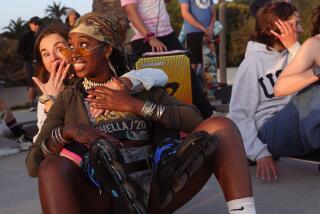Mod music, clothing make a comeback at area clubs
Since she was a teenager, Long Beach resident Darma Elofson has considered herself a mod, part of a stylish subculture with roots in 1960s Britain that set itself apart from motorcycle-jacket-clad rockers. The mod revival that surged stateside and across the Pond in the late 1970s and early ‘80s introduced devotees like Elofson to its tenets of soul music, Italian scooters, and — above all — sharp dressing.
“Typically, as a mod, your shirt would be buttoned up,” she says. “It’s a clean-cut kind of thing, nice and neat, ‘60s style.” But on second Saturdays, Elofson untucks her shirt and undoes a few buttons so she can let loose on the dance floor at Club Soulside, a monthly party of Northern soul, Motown, and vintage reggae music at that keeps ‘60s British subcultures alive and kicking — literally — at West Adams’ Cafe Club Fais Do-Do.
The Northern soul dancers who turn up are known for doing the Shuffle, a high-energy dance which calls for kicks, spins, and tricks that draw on the theatrics of Motown sensations.
“You’ll see some of them do the splits, jump in the air, land on their knees, get down, and touch the floor,” says Douglas Walker of Atwater Village, also a Club Soulside regular. “Everyone wants to be James Brown.”
This is not what is known as the Melbourne Shuffle, a mix of quick footwork and “running man” dance from 1980s Australia most recently popularized by the 2011 LMFAO video for “Party Rock Anthem.”
At Club Soulside, hard-core male dancers wear loose-fitting pants known as “soul bags,” while others like Walker sport fitted suits and skinny ties or more casual Fred Perry and Ben Sherman gear. Women don miniskirts with flats or vintage dresses with go-go boots.
There’s enough musical variety that those who aren’t limber enough for acrobatic hand plants can still find their groove. Marv Mack, who started the club in 2006 and remains its resident DJ, spins rocksteady (a laid-back precursor to reggae) when he senses the crowd needs a rest. Then he picks up things again with up-tempo ska, to which patrons dance the skank, a dance that originated in Jamaican dance halls and was co-opted by British mods. True to form, the tunes are all played on vintage 45s.
Mack got into the subculture as a preteen in Los Angeles in the 1980s. Influenced by the new ska movement, sometimes known as 2 Tone (also the name of an important ska record label), he began participating in local scooter rallies of Vespas and Lambrettas so prized by the original mods. Eventually he began spinning soul music after the rallies, and Club Soulside grew organically from these after-parties.
While the club has moved around to different venues over the years, in October it resettled at Fais Do-Do, which Mack describes as a perfect fit for the night’s soul-driven sound. In addition to its classic décor, he says it has the heritage, noting, “back in the ‘60s, Billy Preston played there, Sam Cooke, and an array of R&B artists.” Since it recently completed renovations, “it was time to come back.” Plus, it has a hardwood dance floor, essential for splits and spins.
Though the club’s 18-and-older policy assures a young contingent among the crowd, the night also attracts veterans like Linda Kovacevich of Riverside, who spent her teen years in the ‘60s and ‘70s in Northern England dancing at famous clubs like the Wigan Casino and Bolton Palais, where parties typically lasted all night. Though she’s no longer up for all nighters, she makes the trek to Club Soulside from Riverside nearly every month. “Once it gets into your blood,” she says, “it’s in, and you just live for Northern soul and Motown.”
More to Read
The biggest entertainment stories
Get our big stories about Hollywood, film, television, music, arts, culture and more right in your inbox as soon as they publish.
You may occasionally receive promotional content from the Los Angeles Times.










